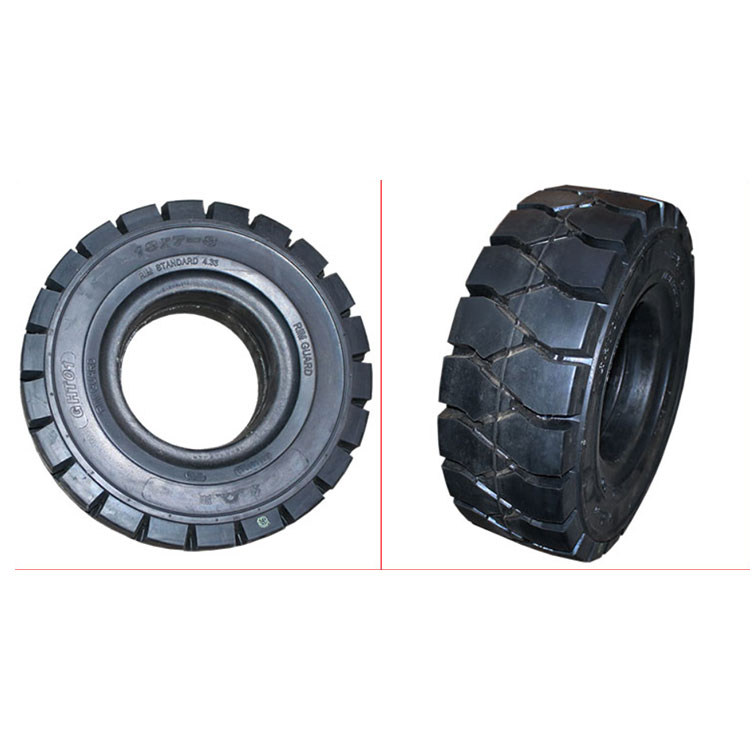Product Introduce
Title: Forklift Tires
Subtitle: Forklift tires are essential components used on forklifts, bearing the weight of the entire vehicle, providing strong support, and enabling flexible movement. High-quality tires can enhance the forklift's handling performance, work efficiency, and safety.
Introduction:
Forklift tires play a crucial role in the operation of forklifts, as they are responsible for carrying heavy loads, navigating various terrains, and ensuring stability during lifting and transporting tasks. Choosing the right type of forklift tire is essential for maximizing productivity, reducing maintenance costs, and ensuring a safe working environment.
Types of Forklift Tires:
1. Pneumatic Tires: Pneumatic tires are similar to those used on trucks and cars, providing excellent shock absorption and traction. They are ideal for outdoor use and rough terrain, offering enhanced stability and a smooth ride.
2. Cushion Tires: Cushion tires are made of solid rubber and are suitable for indoor applications on smooth surfaces. They offer lower maintenance costs, better maneuverability in tight spaces, and increased energy efficiency.
3. Solid Tires: Solid tires are puncture-proof and maintenance-free, making them ideal for heavy-duty applications in harsh environments. They provide excellent stability, durability, and resistance to wear and tear.
Benefits of High-Quality Forklift Tires:
1. Improved Handling Performance: High-quality forklift tires enhance the forklift's traction, stability, and maneuverability, allowing for smoother operation and precise control during lifting and transporting tasks.
2. Increased Work Efficiency: By investing in high-quality tires, forklift operators can work more efficiently, reducing downtime for tire maintenance and replacement, and increasing overall productivity in material handling operations.
3. Enhanced Safety: Reliable forklift tires play a critical role in ensuring a safe working environment, preventing accidents, and minimizing the risk of tire blowouts or failures that could lead to injuries or damage to goods and equipment.
Maintenance Tips for Forklift Tires:
1. Regular Inspections: Inspect forklift tires for signs of wear, damage, or uneven tread wear regularly to identify potential issues and prevent premature tire failure.
2. Proper Inflation: Maintain the correct tire pressure according to the manufacturer's recommendations to ensure optimal performance, stability, and longevity of the tires.
3. Rotation and Alignment: Rotate tires regularly to promote even wear and extend their lifespan. Ensure proper wheel alignment to prevent uneven tire wear and maintain stability during operation.
Conclusion:
Forklift tires are essential components that significantly impact the performance, efficiency, and safety of forklift operations. By selecting high-quality tires, following proper maintenance practices, and prioritizing safety, businesses can optimize their material handling processes and create a secure working environment for forklift operators.

Types of forklift tires
The types of forklift tires can be divided into the following:
1 Solid tire
Solid tires are tires that are pre inflated and reinforced by manufacturers without an internal inflation chamber. It is made of glue and has good wear resistance and puncture resistance. Solid tires are suitable for indoor and flat workplaces, and do not require regular inflation or maintenance.
2 Inflatable tires
Inflatable tires are the most commonly used type of tire for forklifts, and the air pressure can be adjusted according to working conditions and load. Inflatable tires are typically composed of rubber and wheels, which provide better impact absorption and handling performance. Due to the presence of an internal inflation chamber, inflatable tires need to be regularly checked for air pressure and inflated or replaced as needed.
3 Non standard tires
Non standard tires refer to specially designed tires used for specific work scenarios or special loads. For example, wear-resistant tires used in outdoor workplaces, low-temperature tires used in cold storage, etc. Non standard tires typically provide better performance and durability in special working environments.




























